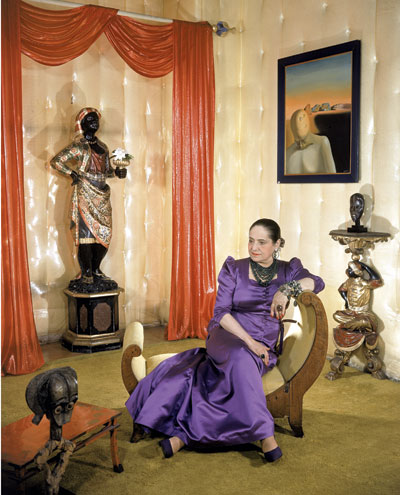In New York, in the 1960s, in a sleek, silvery elevator, I rose from the marble halls of Helena Rubinstein’s gleaming emporium up towards the top floor office of a new friend who worked for that legendary beautician. Suddenly, unexpectedly, the lift stopped, the doors slid open and a tiny, squat figure with oily, inky hair scraped back and livid carmine cheeks above violently purple tweed capes stabbed with a jagged, surreal brooch, stood peering up at what I hoped was my youthful, English-rose complexion. A short, intense scrutiny. Then, imperiously: ‘Oy vey! But I sink ve can help. Tell Patrick he needs gif you our XXX recipe. Now, out of my vay’, she elbowed past me; we descended, not a word more, but not exactly in silence, for she was loudly sucking on a Lifesaver, and, by your leave, let go a none too discreet fart.
My unique encounter with the woman Cocteau called — not, given her machinations, without a touch of irony — the ‘Byzantine Empress of Beauty’, encapsulated her self-made aura: her battle against blemishes, her extravagant style, canny acumen and her famously brusque manner.
The friend I’d been meeting was a tall, elegant and extremely witty Irishman named Patrick O’Higgins. To say he ‘worked’ for this monstre maquillée is not the half of it. He walked her, arranged her contracts, travelled the world with her, was the shoulder she cried on, made amends for her manners, held the heavily jewelled hand when husbands and sons died. And he wrote an amusing, touching, critical but finally sympathetic book, simply titled Madame, about his many years with Helena Rubinstein.
Michèle Fitoussi’s biography of the same subject puts much factual flesh on Madame’s funny-bones. It is credibly researched, fairly accurate, without too many invented conversations and written in powder-pink, though somewhat cliché-ridden, prose. Exclamation marks dot paragraphs like beauty-spots, and there are more ‘such as’s followed by lists of long-forgotten rivals than you can shake a lipstick at.
But Madame’s story is one of resolute endurance. She was born Chaja Silberfeld, in Poland, on Christmas Day 1872, the eldest of seven sisters. Her mother boiled up a lanolin-based gloop that, once jarred, she slathered on the element-shrivelled skin of their Kazimeirz neighbours. Chaja, now self-renamed Helena, saw a far wider clientele. Gathering up 12 jars of Mama’s cream and ‘armed with a parasol’, she set forth, not to jaded Berlin or St Petersburg, but to newly-rich Australia, and an outback township above Melbourne at that. From here, she cabled Krakow with three little words: ‘They need us.’
The creams arrived. Liberal additions of the abundant Aussie flora and fauna gave them fragrance and the lure of jeunesse. Toil in the back room of a wooden shack eventually led to a beauty parlour in Melbourne and the Governor’s wife’s patronage, some backing, the usual slew of hoary suitors, and her first husband, a US citizen called Edward Titus. Helena Rubinstein was ready to beautify Europe, America, the world.
With Titus in tow, Paris was her lodestone, heading straight for the Faubourg St-Honoré: but the bibliophile Titus, who in many ways is the interesting dark horse in the Rubinstein story — he soon befriended Proust, Colette, Man Ray, the Noailles and Louise de Vilmorin — preferred Montparnasse, opening a bookshop to rival Sylvia Beach’s Shakespeare and Company, with his own press, The Black Manikin, publishing Gertrude Stein, Lawrence, Hemingway, Huxley and Samuel Beckett.
His circle gave Helena entrée to the major young artists, and, no slouch, she bought their work to hang hugger-mugger in her burgeoning palaces of powder and paint. She commissioned Louis Sue, Ruhlmann, Eileen Gray and Jean-Michel Frank among many others to design the various world-wide residences she would also cram with an unlikely mélange of African sculpture and even Beidermeier bibelots, often bought from a young antique-dealer named Christian Dior.
With France under her ruby-encrusted belt, Madame, leaving her many salons in the manicured hands of a trio of sisters imported from Poland, sailed for New York and ‘the pitiful purple noses, grey lips …. their faces chalk white from terrible powder’ of American womanhood. ‘My dear, the United States could be my life’s work.’ And so it proved to be. In the twinkling of an eye, she’d opened an orientalist-themed headquarters, and ‘wearing a tomato-coloured dress and eight strands of black pearls’, she and Manka, another hastily summoned sister, displayed avant-garde treatment routines to cosmetically starved Manhattan ladies.
Salons proliferated States-wide, designed by architects Paul Frankl and Rudolph Schindler: paintings by de Chirico, Tchelitchev and Marie Laurencin enhanced blue metallic walls. But Madame had a healthy disregard for her possessions. Many lurked in rarely opened cupboards, while, for the last of her famous alfresco parties at her property on the cote d’Azur, she had her Chagalls, Monets, Renoirs and Modiglianis hung from the trees.
In the late 1920s, Rubinstein sold her company to Lehman Brothers, cannily keeping the stock. And despite two sons, she and Titus divorced. Some years later, past 60 and after a textbook corny courtship, she married Prince Artchil Gourielli- Tchkonia, an equally textbook dashing Russian émigré. Madame revelled in her title, bogus or not, mainly as it was one-in-the-eye for her only comparable rival, Elisabeth Arden. ‘That Woman’, as Helena referred to Arden, quickly responded by getting her own aristo, a Prince Michael Evlanoff. The two cosmetic queens’ public mud-slinging and manager-swapping minefield has been hilariousy detailed in Lindy Woodhead’s War Paint.
That book, and Suzanne Slesin’s magnificent Over the Top, an all-encompassing photographic record of Rubinstein’s extraordinary lifestyle, especially her huge, last apartment on Park Avenue (on being told ‘no Jews’, she bought the entire building), along with O’Higgins’s bittersweet memoir, vividly demonstrate Madame’s astonishing taste and restless determination. This book shows that Helena Rubinstein brought to the business even she could not have realised would become so colossal, a lifelong, intense scrutiny.






Comments